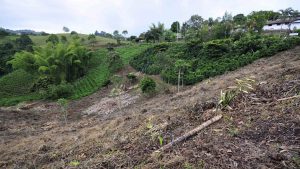
Rainforest Alliance and Fairtrade International adapt to EUDR
The European Union Regulation on Deforestation-free products (EUDR) was adopted to ban imports of several key commodities such as palm oil, soy, timber, beef, rubber,

The European Union Regulation on Deforestation-free products (EUDR) was adopted to ban imports of several key commodities such as palm oil, soy, timber, beef, rubber,

For the past two years, the Ecocoa artisanal and ethical chocolate factory has been offering ‘bean-to-bar’ chocolate, whose forest cocoa is imported in a short
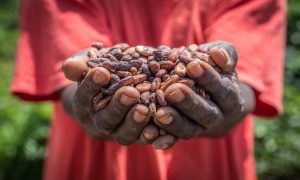
For the past three years, Colruyt has been running a pilot project in Côte d’Ivoire, focusing on the living wage of cocoa producers. The lessons learned should enable the supermarket chain to improve the fairness of its Boni-branded chocolates.
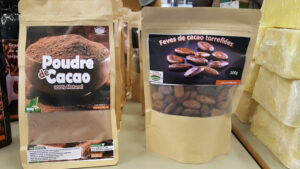
Founded in the village of Anno in the sub-prefecture of Agboville in Côte d’Ivoire, SCINPA (la Société coopérative ivoirienne du négoce des produits agricoles) has launched a host of initiatives for its 4,000 members.

At the World Cocoa Conference held in Brussels from 21 to 24 April, Yeo Moussa, Director of the Yeyasso cooperative, spoke about the support provided by Enabel’s Trade for Development Centre. He was speaking on a panel entitled “Policy Approach of the Belgian Development Cooperation for Sustainable Cocoa Supply Chain”.
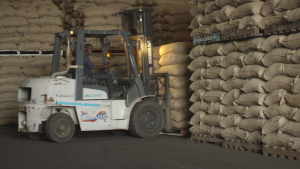
Enabel’s Trade for Development Centre commissioned AKA ZEBRA to carry out a study to clarify and document the operational, financial and commercial procedures and implications

Established in 2005, Belvas, the chocolate factory whose name stands for Belgium and “Valeur Ajoutée pour le Sud” (vas) meaning added value for the South, has made fair trade its trademark. Thierry Noesen, the founder, puts it simply, “If a customer asks for non-fair trade chocolate, we have to say we don’t do that here.”
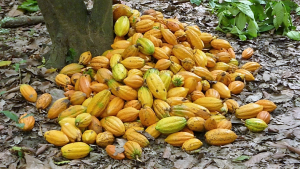
The Cacao-Trace programme, set up in 2015 by Belgian bakery and chocolate specialist Puratos, aims to improve the living conditions of planters by focusing on improved cocoa quality, which also means increased value.
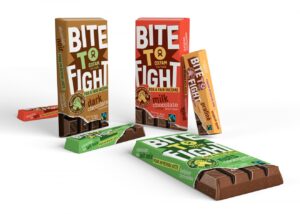
With its ‘Bite to Fight’ range of chocolates, Oxfam Fair Trade aims to reduce the gap that all too often still exists between cocoa farmers’ real income and a fair and decent income.
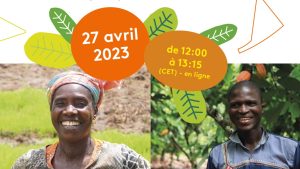
April 27th, Yeyasso, Fairtrade Belgium, Galler Chocolaterie and Enabel’s TDC organised a webinar on the living income gap in the cocoa sector. Measuring this gap between the real household incomes of producers and what is considered a decent income is really important. It can also be a tool to better define policies to support producers, by cooperatives of other stakeholders.

The European Union Regulation on Deforestation-free products (EUDR) was adopted to ban imports of several key commodities such as palm oil, soy, timber, beef, rubber,

For the past two years, the Ecocoa artisanal and ethical chocolate factory has been offering ‘bean-to-bar’ chocolate, whose forest cocoa is imported in a short

For the past three years, Colruyt has been running a pilot project in Côte d’Ivoire, focusing on the living wage of cocoa producers. The lessons learned should enable the supermarket chain to improve the fairness of its Boni-branded chocolates.

Founded in the village of Anno in the sub-prefecture of Agboville in Côte d’Ivoire, SCINPA (la Société coopérative ivoirienne du négoce des produits agricoles) has launched a host of initiatives for its 4,000 members.

At the World Cocoa Conference held in Brussels from 21 to 24 April, Yeo Moussa, Director of the Yeyasso cooperative, spoke about the support provided by Enabel’s Trade for Development Centre. He was speaking on a panel entitled “Policy Approach of the Belgian Development Cooperation for Sustainable Cocoa Supply Chain”.

Enabel’s Trade for Development Centre commissioned AKA ZEBRA to carry out a study to clarify and document the operational, financial and commercial procedures and implications

Established in 2005, Belvas, the chocolate factory whose name stands for Belgium and “Valeur Ajoutée pour le Sud” (vas) meaning added value for the South, has made fair trade its trademark. Thierry Noesen, the founder, puts it simply, “If a customer asks for non-fair trade chocolate, we have to say we don’t do that here.”

The Cacao-Trace programme, set up in 2015 by Belgian bakery and chocolate specialist Puratos, aims to improve the living conditions of planters by focusing on improved cocoa quality, which also means increased value.

With its ‘Bite to Fight’ range of chocolates, Oxfam Fair Trade aims to reduce the gap that all too often still exists between cocoa farmers’ real income and a fair and decent income.

April 27th, Yeyasso, Fairtrade Belgium, Galler Chocolaterie and Enabel’s TDC organised a webinar on the living income gap in the cocoa sector. Measuring this gap between the real household incomes of producers and what is considered a decent income is really important. It can also be a tool to better define policies to support producers, by cooperatives of other stakeholders.